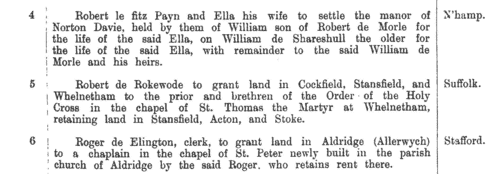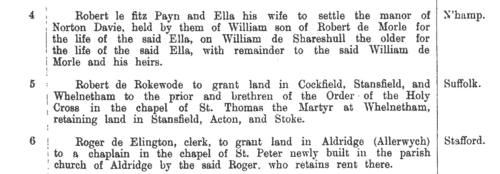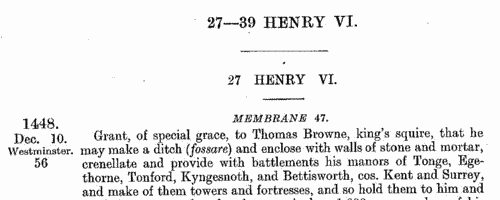Ellerton Surname Ancestry ResultsOur indexes 1000-1999 include entries for the spelling 'ellerton'. In the period you have requested, we have the following 162 records (displaying 11 to 20): Single Surname Subscription | | | Buying all 162 results of this search individually would cost £824.00. But you can have free access to all 162 records for a year, to view, to save and print, for £100. Save £724.00. More... |
These sample scans are from the original record. You will get scans of the full pages or articles where the surname you searched for has been found. Your web browser may prevent the sample windows from opening; in this case please change your browser settings to allow pop-up windows from this site. Inhabitants of Yorkshire: Harthill wapentake
(1380)
The poll tax returns for this wapentake, the area around Market Weighton, Pocklington and South Cave.ELLERTON. Cost: £6.00.  | Sample scan, click to enlarge

| Fine Rolls
(1377-1383)
The fine rolls of the 1st to 6th years of the reign of king Richard II record part of the government administration in England, with orders sent out day by day to individual officers, and commitment of particular responsibilities and duties. There is also some material relating to Wales, Scotland, Ireland and the English possessions in France. ELLERTON. Cost: £4.00.  | Sample scan, click to enlarge

| Yorkshire Testators and Legatees
(1426-1466)
Wills and testaments from the diocese of York (Yorkshire, Nottinghamshire, Hexhamshire, Lancashire north of the Ribble, and southwest Westmorland) registered at York. Richmond and Southwell archdeaconries had their own lower probate jurisdictions, so the wills registered at York are predominantly from the East and West Ridings and the eastern part of the North Riding of Yorkshire. In theory, wills dealt with real property and testaments with personal property, but the distinction hardly applies in practice: most of these wills are in Latin, but some are in English. Being before the Reformation, they commonly start with benefactions to churches, chantries, chapels, &c., and with provisions for the burning of candles ('lights') and saying of masses.ELLERTON. Cost: £4.00.  | Sample scan, click to enlarge

| Clergy, the religious and the faithful in Britain and Ireland
(1471-1484)
These are abstracts of the entries relating to Great Britain and Ireland from the Lateran and Vatican Regesta of pope Sixtus IV. Many of these entries relate to clerical appointments and disputes, but there are also indults to devout laymen and women for portable altars, remission of sins, &c. This source is particularly valuable for Ireland, for which many of the key government records of this period are lost. Many of the names in the text were clearly a puzzle to the scribes in Rome, and spelling of British and Irish placenames and surnames is chaotic. Sixtus IV was consecrated and crowned 25 August 1471 (the day from which his pontificate is dated) and died at Rome 12 August 1484. The extracts were made by J. A. Twemlow from Vatican Regesta dxlvi to dclxxxi and Lateran Regesta dccxiii to dcccxxxviii, and published in 1955. Not all the Lateran registers survive from this pontificate, but were still in existence in the 18th century, when indexes were compiled giving rubricelle, or brief summaries of the papal bulls; nor, indeed, have all these indexes now survived, but Twemlow added an appendix listing all the rubricelle relating to the British Isles extant for the reign of Sixtus IV.ELLERTON. Cost: £4.00.  | Sample scan, click to enlarge

| London and Middlesex Feet of Fines
(1198-1485)
Pedes Finium - law suits, or pretended suits, putting on record the ownership of land in London and Middlesex.ELLERTON. Cost: £4.00.  | Sample scan, click to enlarge

| Norfolk Feet of Fines
(1307-1485)
Pedes Finium - law suits, or pretended suits, putting on record the ownership of land in Norfolk. These abstracts were prepared by Walter Rye.ELLERTON. Cost: £4.00.  | Sample scan, click to enlarge

| Landowners and tenants in Cambridgeshire
(1345-1485)
Inquisitions ad quod damnum were held by the appropriate sheriff or escheator (or other officer in whose bailiwick the matter in question might lie) to investigate cases in which the royal or public interest might be damaged by proposed alienation or settlement of land (especially alienation to religious uses, into mortmain). The key findings from these inquisitions were as to the tenure of the land and the service due from it; its yearly value; the lands remaining to the grantor, and whether they sufficed to discharge all duties and customs due from him; and whether he can still be put upon juries, assizes and recognitions, so that the country be not burdened by his withdrawal from them. Generally speaking, this process had the makings of a system of licensing such alienations, and raising money in proportion to the valuations. Equally, there are many items that deal with subjects such as the closing of public roads, the felling or inclosing of woods, or the proposed grant of liberties or immunities. A calendar of these inquisitions from the 19th year of the reign of king Edward III to the 2nd year of Richard III was prepared by the Public Record Office and published in 1906. We have now indexed this calendar by surname and county. Most of the individuals appearing in the calendar are either pious individuals seeking to make grants to religious bodies for the sake of their souls; or landowners securing the disposition and settling of their real estate. But some other names do appear - tenants, trustees, chaplains and clerks.ELLERTON. Cost: £6.00.  | Sample scan, click to enlarge

| Landowners and tenants in Norfolk
(1345-1485)
Inquisitions ad quod damnum were held by the appropriate sheriff or escheator (or other officer in whose bailiwick the matter in question might lie) to investigate cases in which the royal or public interest might be damaged by proposed alienation or settlement of land (especially alienation to religious uses, into mortmain). The key findings from these inquisitions were as to the tenure of the land and the service due from it; its yearly value; the lands remaining to the grantor, and whether they sufficed to discharge all duties and customs due from him; and whether he can still be put upon juries, assizes and recognitions, so that the country be not burdened by his withdrawal from them. Generally speaking, this process had the makings of a system of licensing such alienations, and raising money in proportion to the valuations. Equally, there are many items that deal with subjects such as the closing of public roads, the felling or inclosing of woods, or the proposed grant of liberties or immunities. A calendar of these inquisitions from the 19th year of the reign of king Edward III to the 2nd year of Richard III was prepared by the Public Record Office and published in 1906. We have now indexed this calendar by surname and county. Most of the individuals appearing in the calendar are either pious individuals seeking to make grants to religious bodies for the sake of their souls; or landowners securing the disposition and settling of their real estate. But some other names do appear - tenants, trustees, chaplains and clerks.ELLERTON. Cost: £6.00.  | Sample scan, click to enlarge

| Recipients of grants of land by the Crown; and other grantors and grantees
(1427-1516)
Grants of land by the Crown were enrolled on the Charter Rolls: but this series of records was also used by other magnates and religious houses as a way of having their own deeds inspected, confirmed and registered. It will be seen from this that some of the material described in these inspeximuses dates back to a considerably earlier period. In addition, there is an appendix of fragments of charter roll material from 1215 and 1286 to 1288. The royal grants enrolled relate not only to land, but also to various privileges that were part of the royal prerogative.
Most of the material is from England, the remainder relating to Ireland, Wales and possessions in France, but virtually nothing from Scotland, which was an independent kingdom at this period.ELLERTON. Cost: £4.00.  | Sample scan, click to enlarge

| Tenants, founders and incumbents of Yorkshire chantries
(1546-1548)
Chantries were established to perform services for the souls of their founders and other faithful dead, including annual obits and anniversaries at which alms were usually distributed. The chantries could be at an existing altar in a parish church, a new altar in a side chapel of an existing church, in a new chapel in the churchyard or some miles from an existing church: few were founded before 1300, and most date from 1450 to 1500. Hospitals were places provided by similar foundations to receive the poor and weak; there were also religious guilds, brotherhoods and fraternities, and colleges (like large chantries at which three or more secular priests lived in common). An Act of Parliament of 1545 gave king Henry VIII the power to dissolve such chantries, chapels, &c., the proceeds to be devoted to the expenses of the wars in France and Scotland. Commissioners were appointed 14 February 1546 to survey the chantries and seize their property, and from 1546 to 1548 the commissioners produced these certificates giving brief details of the establishment and nature of each foundation, with an inventory of valuables and rental of lands. The individuals named in the certificates are thus the founder, the present incumbent, and the tenants whose rents provided the chantry's income. All the surviving certificates were edited by William Page for the Surtees Society, and published from 1892.ELLERTON. Cost: £6.00.  | Sample scan, click to enlarge

|
Research your ancestry, family history, genealogy and one-name study by direct access to original records and archives indexed by surname.
|












